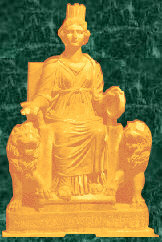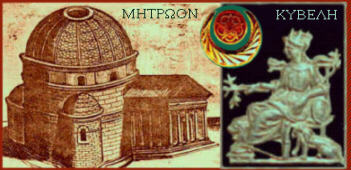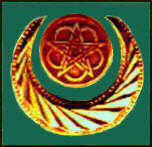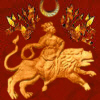
|
|
To the Great Idaean Mother of the Gods ...
the Gallae of Rome have dedicated this page.

Cybele's Temple Matreum on the Palatine Hill, Roma
Esta página en español
Questa pagina in italiano
Esta página no português

|
|

Esta página en español
Questa pagina in italiano
Esta página no português
|
In the five hundred fiftieth year of Rome's founding, Magna Mater was enthroned as Sacred Protectress of the City. From distant Pessinus in Asia Minor came Her Image of silver and black meteoric stone from the starry heavens, accompanied by a conclave of the Gallae, male-born priestesses whose Order had served the Goddess in Phrygia for millennia. What destiny had summoned them to the cause of Rome? In this greatest crisis of the Punic Wars, Hannibal was virtually "at the gates" already ravaging the countryside of Italia. Consultation of the Sibylline Books guided the Romans to seek aid from the same Great Mother known to their reputed ancestors of Trojan fame. It was the noblest Lady of Rome, Claudia Quinta, who personally welcomed the entourage of Cybele at Ostia, pulling the ship with her own virtuous strength, an episode considered then a miraculous sign of favored destiny. At Rome, the Mother of the Gods was appropriately housed in the temple of Victoria. Censors M Liuius Salinator and C Claudius Nero initiated a thirteen-year construction plan to honor Cybele with a worthy edifice on the Palatine Hill. From Claudia's own lineage would come many of Rome's greatest, as the fortunes of Hannibal, and Carthage itself, withered as a dying branch. Cybele's Matreum (Mêtrôön, in the Hellenic tongue) was formally dedicated by Praetor M Iunius Brutus on IV ID APR AVC DLXIII (10 April of 191 bce) , celebrated as the birthday festival of the Ancient Goddess, closing the week of the Megalensian Games held annually in Her honor. The Gallae, except for market days and festivals, stayed within the confines of their Phrygianum sanctuary on the Vatican (named for the vaticinari or fortunetellers). The more conservative Romans, though grateful for the favor of the Mother of the Gods, were alternately fascinated and shocked by the exotic splendor of the Gallae. Roman Religion had little of passionate frenzy, self-flagellation, clashing of cymbals, and dancing to the wailing drone of Oriental flutes. Some Romans however found the passion impelling to the point of imitating the emasculation Mystery of Attis, so the Magistrates forbade Citizens from actually becoming Gallae. A century after the arrival of the Great Mother in Rome, Marius removed several of these restrictions on Gallae, Phrygian and Roman alike, and in a later age, the Emperor Claudius, most sympathetic to Cybele's daughters, granted us full freedom in the Eternal City and Roman world. Traditionally, the community of Gallae were ruled by a Battakes and an Attis, reverend-mothers from among their own. The Emperors Claudius and Antoninus Pius somewhat reorganized the cult worship of Cybele and Attis with parallel Roman and Phrygian Sacred Colleges. The title of Battakes is given as Archigallus in Latin, and from the time of Claudius, a Roman citizen could legally fill this role. Sacerdos Matris Deum, Priestess of the Mother of the Gods, is another honored designation. Please view our page of Resources on Roman Civilization for a wealth of links and references on Magna Mater, Her Gallae, and the Roman world.
|
|
Mother of the immortal gods, She prepares a fast-riding chariot, drawn by bull-slaying lions: She who wields the Scepter over the renowned pole, She of the many names, the Honored One!
Thou occupiest the Central Throne of the Cosmos,
By Thee there was brought forth the race of immortal and mortal
beings!
Go to the Feast, O Lofty One! Delighting in drums, Tamer of all,
Generous Goddess of Ida, You, Mother of Gods, --- Aeneas, speaking through the words of Vergil. |


|
Who is then the Mother of the Gods? She is the source of the intellectual and creative gods, who in their turn guide the visible gods: she is both the mother and the spouse of mighty Zeus; She came into being next to and together with the great Creator; She is in control of every form of life, and the Cause of all generation; She easily brings to perfection all things that are made. Without pain She brings to birth ... She is the Motherless Maiden, enthroned at the very side of Zeus, and in very truth is the Mother of All the Gods ...
--- Emperor Julian II "the Blessed", |

|
|---|
 |
This page created by:
|

|